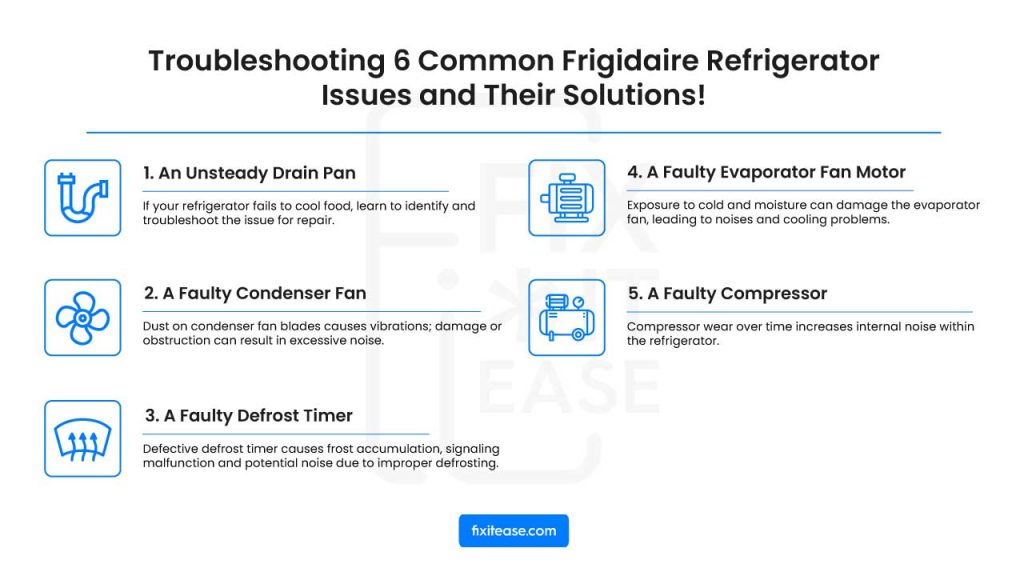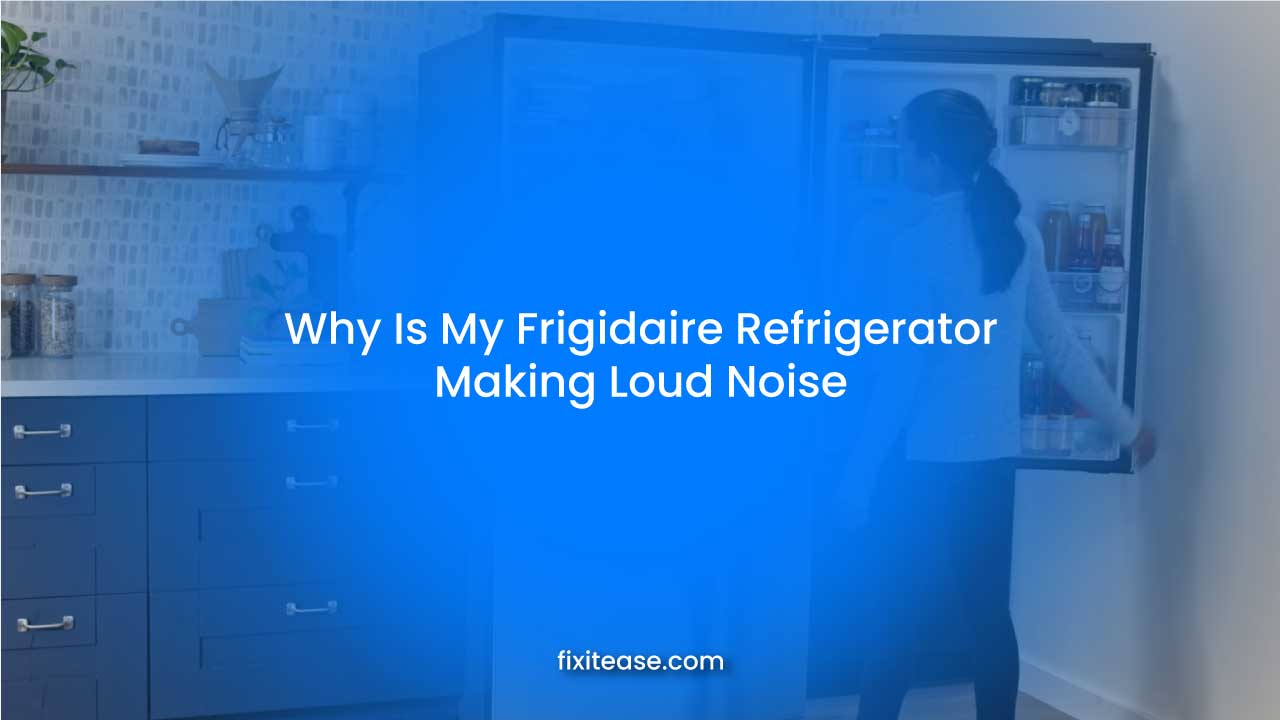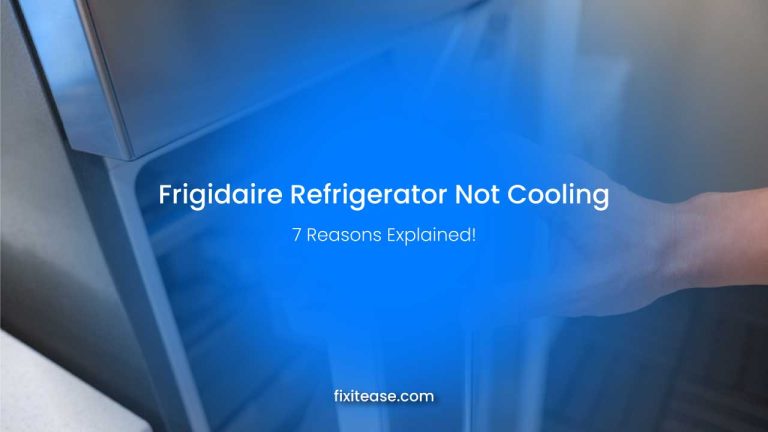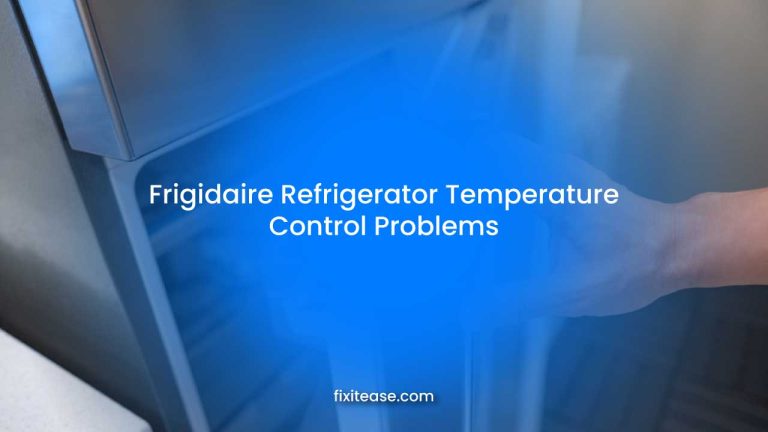Why Is My Frigidaire Refrigerator Making Loud Noise?
As a refrigerator owner, you may hear chirping, humming, or clicking noises that are not harmful in most cases. But there are loud noises gurgling, knocking, cracking, and others that can mean that your refrigerator wants to send you a message.
You may wonder, why is my Frigidaire refrigerator making loud noise? There could be reasons like an unsteady drain pan, a faulty condenser or evaporator fan, a faulty defrost timer, and a faulty compressor. Yes, all these parts of your refrigerator can create a noisy environment but you need to know the individual problem and take action accordingly.
Let’s get into the details and know everything about how you can deal with a noisy Frigidaire refrigerator.
Troubleshooting Guide: Why Your Frigidaire Refrigerator Is Louder Than Usual

After going through the sections below, you’ll not have questions like why is my Frigidaire refrigerator so noisy? Let’s see how true is the statement!
1. An Unsteady Drain Pan
What Causes It
The primary cause of this issue is the vibration of the refrigerator, which can displace the drain pan from its correct position. As a result, it may start rattling or even come into contact with the radiator, creating a buzzing sound.
How to Identify
If you notice a rattling or buzzing noise originating from the bottom of your Frigidaire refrigerator, it might be due to an unsteady drain pan. The drain pan, also known as a drip pan, is positioned beneath the refrigerator to collect water from the defroster. Vibrations from the refrigerator can cause it to become loose, potentially leading to an annoying noise.
How to Fix It
- First thing first, check the refrigerator’s manual to identify the exact placement of the drain pan. Disconnect the refrigerator from its power and water sources.
- Remove the kick plate at the front of the fridge, or if necessary, move the fridge away from the wall to access the drain pan.
- Use a screwdriver to tighten the screws in the drain pan’s bracket. Replace the kick plate or slide the fridge back into place.
- Reconnect the power and water sources.
How to Prevent It
To prevent the drain pan from becoming unsteady in the future, periodically check its placement and ensure it is securely in position. Also, inspect the supports to confirm they are not bent or damaged, as worn supports can contribute to the issue. Regular maintenance and securing the drain pan can help maintain a quieter and more efficient refrigerator.
2. A Faulty Condenser Fan
What Causes It
The primary cause is the accumulation of dust and debris on the condenser fan blades. This accumulation can result in vibrations and noises. If the fan blades are damaged or obstructed, they can lead to excessive noise.
How to Fix It
- Start by disconnecting the refrigerator from its power source. Carefully pull the fridge out from the wall to access the rear part.
- Locate the condenser fan and remove any covering panel if needed. Check the fan blades for damage. If they are damaged, they should be replaced.
- Try to rotate the fan blades. If they do not turn freely, the fan motor might be defective and needs replacement.
- Ensure that the fan blade is not loose or scraping against any panel or bracket, which could be causing the rattling sound. Examine the fan motor grommet for signs of wear and tear. If it’s worn out, it should be replaced.
How to Prevent It
To prevent condenser fan blade issues, regular cleaning is key. Clean the fan blades every six months to a year to avoid the buildup of dust and debris. Additionally, maintaining clean condenser coils can help the fan operate efficiently. Keep the area around the condenser fan clear to prevent obstructions and vibrations that lead to noise.
3. A Faulty Defrost Timer
What Causes It
A faulty defrost timer can lead to the accumulation of frost in the refrigerator and freezer compartments. This buildup can be a clear sign of a malfunctioning timer. The timer controls the defrost cycle, and if it’s not functioning correctly, it can result in excess frost and, consequently, noise issues.
How to Identify
- Locate the Defrost Timer: Defrost timers can be found in various places depending on your fridge model. They are commonly located near the bottom, often behind a kick grate, or even inside the fridge near temperature controls.
- Remove the Casing: Most defrost timers are concealed within a plastic casing, which you may need to remove.
- The Turn Test: Twist the defrost timer with the advance screw clockwise until you hear a click. Now, turn your fridge back on and leave it for about half an hour. If you hear clicking sounds during this time, the defrost timer is likely broken.
How to Fix It
- Unscrew the timer and disconnect the wires holding it in place. Make sure to remember how each wire was connected.
- Install a new timer with the exact same model number as the old one, attaching the wires the same way. Replace the cover(s) over the timer.
- Plug the refrigerator back in and close the door. You should soon hear the normal, quiet sounds of your fridge cycling the compressor.
How to Prevent It
Preventing a faulty defrost timer largely involves regular maintenance. Keep an eye on any signs of frost buildup in the refrigerator and freezer compartments. If you notice this, consider it a potential indicator of timer trouble. Regular cleaning and maintenance can help ensure that your defrost timer operates smoothly and quietly, avoiding further noise issues.
4. A Faulty Evaporator Fan Motor
What Causes It
A noisy evaporator fan motor can result from damage caused by exposure to cold temperatures and moisture. The primary indication of a defective evaporator motor is typically a squeaking noise originating from its location. Temperature fluctuations, issues with cooling, or slow freezing are also common symptoms of a failing evaporator motor.
How to Identify
- Remove Evaporator Cover: If the noise appears to come from inside the fridge, remove the evaporator cover situated at the back or bottom of the freezer.
- Clear Formed Ice: Examine the fan housing and the plastic ring around the fan blades. Ice formation on these parts may be impacting the fan blades, resulting in a continuous clatter. Remove any ice and observe if the noise lessens.
How to Fix It
- Locate a Replacement Fan: Find a replacement fan that is compatible with your refrigerator model.
- Remove the Old Fan: Within the evaporator fan compartment, you’ll find the existing fan unit. Secure the replacement part and have it ready for installation. Remove the one to three screws that are securing the old fan in place. As you remove the screws, ensure you remember their positions, as you’ll need them to secure the new fan.
- Install the New Fan: With the old fan out of the way, take the new fan unit and connect the wires exactly as they were connected to the old fan. Ensure a snug and secure connection.
- Return the Cover: Now that the new fan is securely installed, return the evaporator cover to its original position. Fasten it with the same screws or clips that you removed earlier, ensuring it is tightly secured.
How to Prevent It
Keep the fan clean from dust and ice buildup. Regularly check for signs of wear and tear on fan components, including wires and grommets.
5. A Faulty Compressor
What Causes It
- Internal Component Wear: Over time, the internal components of the compressor can wear out, generating more noise than usual.
How to Identify It
The most prominent indication of a faulty compressor is unusual noises that differ from the regular hum of your refrigerator. These noises often become more noticeable and disruptive. There are a few distinct sounds to watch for:
- Loud Humming or Buzzing: If your compressor is failing, you may hear a loud humming or buzzing sound. This typically indicates issues with the compressor motor.
- Knocking Sound: A knocking sound when the compressor turns on or off is another sign of compressor trouble. This noise suggests that the compressor motor may not be securely housed, leading to the knocking sound.
How to Fix It
Repairing or replacing a faulty compressor is a complex and potentially hazardous procedure best left to professionals. When your refrigerator’s compressor is causing noise issues, consider the following steps:
- Inspection and Diagnosis: Consult an experienced technician who will inspect the compressor’s condition and identify the source of the problem. He will determine if the compressor can be repaired or if a replacement is necessary.
- Compressor Replacement: If the compressor is beyond repair, the technician will replace it. The new compressor will be carefully installed to ensure proper functioning.
- Compressor Lubrication: In some cases, excessive noise might be due to insufficient lubrication. Technicians can lubricate the compressor to address this issue.
How to Prevent It
Dust and dirt can accumulate on the condenser coils, making the compressor work harder. Clean these coils regularly to improve efficiency. Also, schedule routine maintenance by a qualified technician to inspect your refrigerator and address potential issues before they become major problems.
FAQs
How do I stop my fridge from making a loud noise?
To put a halt to your noisy fridge, you can take a few steps. First, check and clean the condenser coils, usually located at the back. Accumulated dust and dirt can cause extra noise. Second, inspect the evaporator and condenser fans. If they’re damaged, they might need replacement. Lastly, have a look at the compressor, which can be noisy when failing. For a quick fix, leveling your fridge can help reduce vibrations and noise.
How loud is a fridge compressor?
A fridge compressor typically generates a noise level ranging from 45 to 55 decibels. To put it into perspective, that’s maybe a light background noise. This humming or buzzing sound is quite normal as the compressor cycles on and off to maintain the desired temperature. However, if you notice a significant increase in noise, it might be an indication of an issue that needs attention, such as a failing compressor.
Last Words
In summary, when your Frigidaire refrigerator starts making loud, unusual noises, it’s important to identify the source of the problem.
We discussed various common culprits, including a malfunctioning compressor, faulty evaporator fan motor, problematic defrost timer, and noisy condenser fan blades. Each issue was explored with steps on how to identify, what causes it, how to fix it, and how to prevent it.
Remember that some noises, like the normal hum of a compressor, are typical. But if the noise becomes excessive, it’s wise to consult a professional technician to ensure your refrigerator operates quietly and efficiently.







